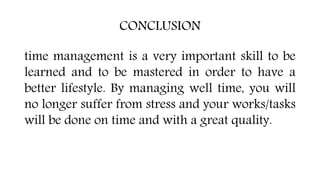Time management
- 2. Time Management PresentedBy: ARSHAD ALI (10787) BEEE8th Semester Departmentofelectricalengineering NUMLIslamabad.
- 3. TIME •Time is the most precious thing we have •Time is ultimately the most valuable resource •Time is totally perishable •Time cannot be stored up for later use.
- 4. TIME •Everyone in the world, in East or West, whether he or she is living in a developing country or in a developed country, rich or poor, has one thing in common and that is time. •Everyone has got twenty-four hours in a day!. However, some people achieve more and more in the same 24 hours but some people are unable to achieve much. Because it is due to time management.
- 5. What is time management? •Time management is the act or practice of managing and supervising time. •Time Management refers to managing time effectively so that the right time is allocated to the right activity.
- 6. Why do we need TM? •To save time •To reduce stress •To function effectively •To increase our work output •To have more control on our Lives
- 7. Principles to manage your time: •There are three most important principles to manage the time. •Setting the table. •Set Smart goals •Plane every day in advance. •Prioritize.
- 8. Principle No 1: Setting the table To set the table we must have to follow the 3 steps procedure. • Step 1 Decide: decide exactly what do you want. Analyze your financial life, health, relationship, social life and other important Aspects of your life and be clear about your goals in every aspects of life. • Step 2 Write on paper: people who write their task on the paper 5 to 10 times they have more likely to achieve their goals. Our brain is not good for storage it is very good for creating new ideas and creative thinking. Therefore make it your habit to write your tasks on the paper. If it is not possible to write it on the paper then write it in your mobiles at least • Step 3 make deadlines: if we want to finish a task then it is very important to give deadline to that task.
- 9. Principle no 2: Set the goals To set the goals for your task keep in mind the word smart. S- Specific. M- Measurable. A-Actionable. R- Relevant. T- Time bound.
- 10. SMART •Specific: specify your goals if the goals are less specific the more it will be difficult to achieve if the goals are more specific it will be easier to achieve that. •Measurable: measure your goals in term of success that how much you will be successful to achieve that goals. •Actionable: how much you will be able to be done or acted on your goals. Do you have the resources and capabilities to achieve the success or not.
- 11. SMART •Relevant: how much the goals are relevant to your work. How much it closely connected or appropriate to what is being done or considered. •Time bound: the goals or tasks that is measured or restricted by time. This means. That you would have only a certain amount of time to achieve that.
- 12. Principle no 3: plane every day in advance •Failing to plan is planning to fail •For planning there is one important approach called 6p approach which helps you to achieve more in less time. •Proper Prior Planning Prevents Poor Performance.
- 13. Principle no 3: plane every day in advance (cont’d) Before you going to start your work you should going to make a plan because a few minutes plan can save your time in hours and helps you in finishing your work as soon as possible without any problem. If you do not make a plan at the end it will create confusion and compel you on the procrastinate
- 14. Principle no 4: prioritize: For prioritize the tasks we can use a 4 D approach. •Do •Delegate •Delay •Delete
- 15. 4 D approach. •Do: means do it now those works which is very important and you must have to do it in every aspect. •Delegate: giving responsibilities to others mean give your task to others if it is not related to you. •Delay: delay those works which is not important and there is no deadline for it. •Delete: those activities that just waist your time.
- 16. CONCLUSION time management is a very important skill to be learned and to be mastered in order to have a better lifestyle. By managing well time, you will no longer suffer from stress and your works/tasks will be done on time and with a great quality.















